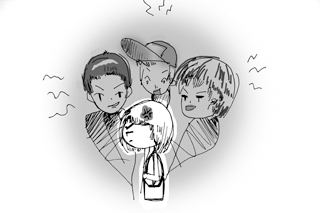
As soon as she walked out to the front gate, Shim Yeoan-sun (Humanities, 1) was approached by a stranger, who urged her to sign a contract for a new card. He explained that, if she paid only 20,000 won a month, she could take advantage of a special feature of the card and watch any of the latest movies, musicals, or plays currently in the theaters as well. Shim said that she did not want to have the card. However, the man was so persistent that she eventually signed up.
Later on, Shim logged on to the website the man said she could get her tickets in advance, but she discovered that the options she had available were nothing like what was promised. When she clicked on the latest movies that she wanted to watch, she was not able to watch any of them since the card company was still trying to make contact with the theaters.
"After that, I looked on the Internet and found out that these kinds of incidents happen a lot around university areas," said Shim.
At the beginning of a new semester, fraud cases targeting university students double. Excited freshmen starting their college lives are especially easy targets for these incidents.
"Because freshmen do not know much about university life and are so lighthearted, it is effortless to trick them into spending money," said Nah Kyoung-sil, the head of the Consumer Union of Korea.
According to Nah, most fraud cases involve selling teaching materials or publications, such as Time magazine, that freshmen believe are necessary to read now that they are in college. Sellers call freshmen's cell phones and tell them how cheap subsciptions are and convince them that they should keep studying English by reading these magazines.
Frauds like Shim's experience involving cards with cultural or entertainment perks are another common type affecting university students. The explanations given for these card hoaxes may be partly true, but they are not clear to the students, especially since they are usually done quickly on the street.
"At first, they only talked about issuing the card to see movies and musicals. But when I was about to go, they said that I had to pay some money," said Yang Chai-won (Sookmyung University, 2).
Choi Young-joo (Yonsei University, 2) also suffered a similar deception and tried to call the company to complain about the poor service.
She demanded a refund of what she paid and canceled her card membership. But despite her constant complaints, the company did not refund her deposit. After a while, Choi discovered similar stories on the Internet as well as on television.
"During the semester, people actually came into classrooms and tried to get students to sign up for the same contract that I signed," said Choi.
Nah warns students to be careful about such sales offers. She says that if the person mentions anything being "free" of "special", it is one hundred percent certain to be a fraud.
"There is no such thing as a free ride. Always question the other person's intention when something is free," said Nah.
Nah also says, "Anything that you signed up for via phone calls or on the street can be canceled in 14 days. Things that you have purchased via the Internet or television can be canceled in seven days." But the product must not be damaged to get a refund.
According to the Consumer Protection Department of the Fair Trade Commission (FTC), another scheme students should avoid is joining a multilevel marketing company where they sign a contract to sell a certain number of items that they must first buy from the company. Most students who get involved in multilevel marketing are introduced by acquaintances that usually know that they are having a hard time finding a job. After they attend an introductory session, the senior salespeople then badger or coerce them into signing contracts to join the company.
To avoid coercive employment, the FTC says the most important thing is to check the company's background, especially to check whether it is properly registered, before any involvement. If you do get trapped in an unfair contract, the FTC says you should resign and look for help from acquaintances or the police.
Freshmen should also remember that if they are minors, a contract is not valid and it can be canceled any time.

